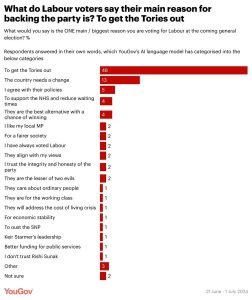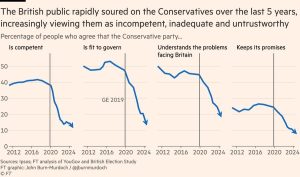After 14 long years of real-terms cuts in funding alongside increased pressures on the NHS, its 76th birthday (July 5) saw a change of government, and promises of a change in policy. The first was Labour’s new Health and Social Care Secretary Wes Streeting stating clearly that the NHS has been “broken” – and needs to be fixed.
Streeting went on to argue that “This government has received a mandate from millions of voters for change and reform of the NHS, so it can be there for us when we need it once again,” and this is clearly true, although not in the way he meant it.
With 412 Labour MPs and a huge majority in the House of Commons, Keir Starmer’s Labour government clearly now has the power to bring in real change.
However, the low 59.9% turnout, Labour’s national share of just 33.7% of the votes cast, and its lower number of votes (9.7m, compared with the ‘disastrous’ 10.2 million won by Jeremy Corbyn in 2019) make it much less a resounding vote for Labour’s hyper-cautious manifesto than a thumping rejection of Rishi Sunak’s right wing Tory Party, which has been reduced to 121 MPs.

A telling Yougov poll on why people voted Labour reveals a massive 48% did so to kick out the Tories plus another 13% who thought it was time for a change, compared with just 5% saying they agreed with Labour’s policies and 1% who specifically support Keir Starmer’s leadership.
Likewise survey data compiled by John Burn-Murdoch for the Financial Times (below) sums up the public’s overwhelming loss of any confidence in the Tories, with plunging ratings on competence, fitness to govern, keeping promises or understanding the problems facing Britain.

Only in Scotland, where the SNP vote collapsed in the aftermath of political splits and financial scandals, was there a marked swing to Labour, while Labour’s vote in Wales actually declined even as they won more seats.
Progressive majority
The Lib Dems, who decisively broke from their party’s dire record in David Cameron’s coalition and ran an explicitly anti-Tory campaign, won 12.9% of the vote, and an extra 60 seats – taking some prominent Tory scalps on the way, including Jacob Rees Mogg.
Their keynote policy was to increase progressive taxation to boost spending on the NHS and social care.
The Greens, with the most radical call for taxes on the rich, to fund a big increase in health and public sector spending, grew to 6.7% of the vote, winning all four of their target seats and coming second in 47 constituencies.
On this basis an overall majority (52.6%) of the votes were cast for main parties backing progressive change, in addition to the five seats that were won by left-leaning Independents, and significant numbers of votes also cast for unsuccessful left-wing challengers to Labour.
By contrast the Tory vote almost halved to 6.75 million (23.7%), with many Tory voters switching not to Labour, but plumping for the right wing, jingoistic populism of Reform, which won 4 million votes (14.3%), only slightly more than the 3.8 million votes won by its fore-runner UKIP back in 2015.
So in total just 39% (plus the votes for Ulster Unionist parties) were votes for parties on the right.
Labour has therefore benefited from the split in the right-wing vote, with Reform carrying through its threat to stand in every seat against the Tories, whereas they did not contest Tory-held seats in 2019.
The upshot is a clear majority of the electorate rejecting Tory policies and favouring progressive change, which gives Labour a very clear mandate to carry through its manifesto pledges – and raise the necessary resources to do so.
By contrast there is no mandate to hold back on promised changes. The NHS will not be fixed without additional funding, and if Labour is to honour its commitment not to raise VAT, or increase income tax or national insurance for “working people,” the extra money needs to flow from progressive taxation.
Further Reading:
Now Labour is in, press for action to rescue the NHS
Dear Reader,
If you like our content please support our campaigning journalism to protect health care for all.
Our goal is to inform people, hold our politicians to account and help to build change through evidence based ideas.
Everyone should have access to comprehensive healthcare, but our NHS needs support. You can help us to continue to counter bad policy, battle neglect of the NHS and correct dangerous mis-infomation.
Supporters of the NHS are crucial in sustaining our health service and with your help we will be able to engage more people in securing its future.
Please donate to help support our campaigning NHS research and journalism.


